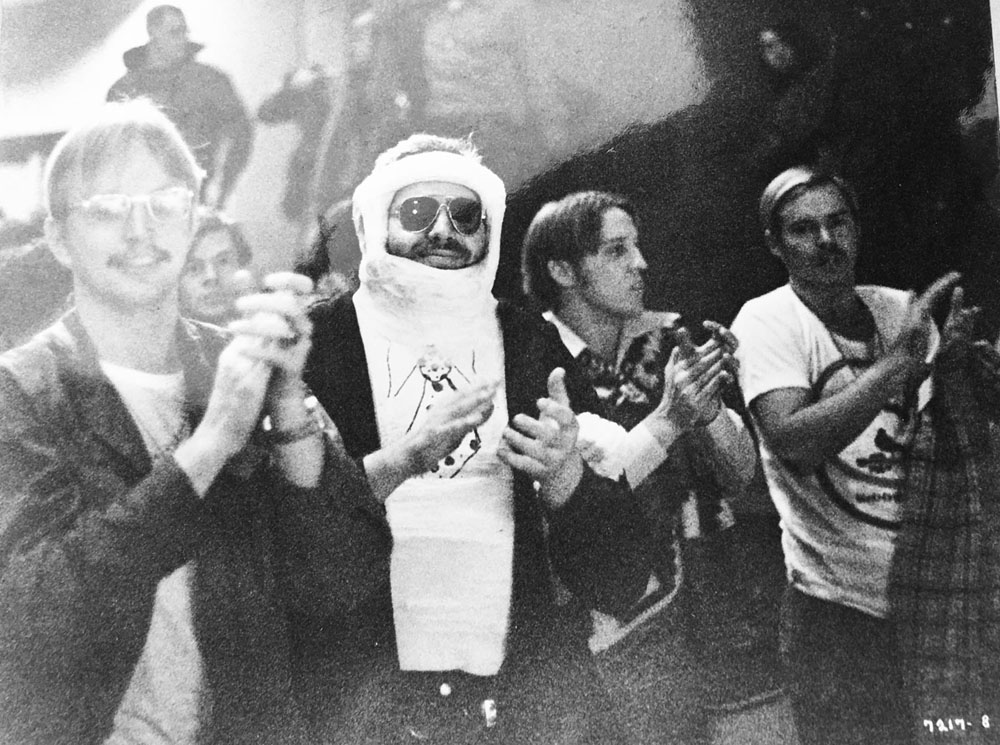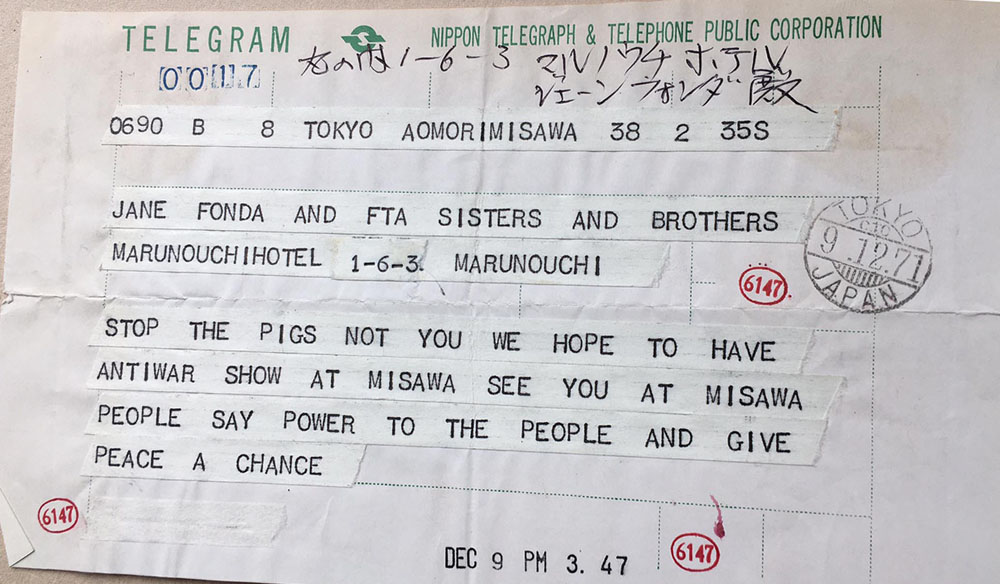 Download PDF of this full issue: v51n1.pdf (21.1 MB)
Download PDF of this full issue: v51n1.pdf (21.1 MB)From Vietnam Veterans Against the War, http://www.vvaw.org/veteran/article/?id=3979
 Download PDF of this full issue: v51n1.pdf (21.1 MB) Download PDF of this full issue: v51n1.pdf (21.1 MB) |
After being trapped in a vault for decades, FTA!, the documentary about the FTA Show tour in Asia in the winter of 1971, is being rereleased this year. Here are some of my memories of that journey.
Flyers in English and Japanese were posted in store windows, tacked on telephone poles and passed from hand to hand. GIs stationed all over Okinawa had heard about the traveling show with Jane Fonda, Donald Sutherland and a cast of Hollywood actors and singers called FTA!. Excitement had been running high for days beforehand and that evening's performance was sure to be packed.
But that morning the military struck back. A "Condition Green" command was issued, ordering all soldiers confined to barracks after 6 pm. What were we to do? The hall we had rented for the evening show was a municipal building and not available during the day. We had come too far to abandon the show, so we conferred with our Okinawan allies. The Ichikawa Bullring is not too far from the base, they explained, can we move the show there?
Hollywood stars in a bullring? At the height of the Vietnam War, with the bases on strict curfew? Sure, no problem. Was there a stage? Not yet, but they could quickly build one from wooden pallets and oil drums. Was there a place to hang the backdrop and curtain? They would rig up sturdy metal frames. Juice for the sound system? Someone's electrician father could connect us to a nearby office building.
The seating was open air, on grassy slopes surrounding the dusty bullring. As soon as the venue change was announced on the radio, people began pouring through the gates—GIs in and out of uniform, Okinawan grandmas dressed in traditional kimonos with children in tow. Within minutes after taking the stage, folk singer Len Chandler had the whole crowd singing, "We Will Not Bow Down to Genocide."
That unforgettable November afternoon in Okinawa embodied the spirit of our show: resistance to the war, solidarity with the people of Asia whose lands the military occupied, and respect and support for the GIs who refused to be part of the repressive military machine or killers of people in Vietnam.
As the Advance Coordinator for the show, I was brought on to work with local GI groups—coffeehouses, newspapers and organizing teams—and anti-war organizations in Hawaii, Japan, Okinawa and the Philippines who supported our efforts. Though I was only about the same age as most of the GIs, I had cut my teeth as an organizer for the United Farm Workers.
My task was facilitated by Pacific Counseling Service and the National Lawyers Guild, two progressive organizations that already had ties with both the GIs and Asian activists. With a list of the technical needs for the show in hand, we had to scout out suitable venues, secure equipment (everything from a piano tuned to A 440 to 25 lb. sandbags to weigh down wires, stands, etc.), arrange lodging (not always easy to find a cheap hotel that wasn't a brothel in the gritty base towns) and ground transportation, print and distribute publicity, enlist stagehands and security teams, and, perhaps most importantly, set up meetings for the cast and crew with GIs and political groups.
At the last minute, we learned that FTA director Francine Parker was also bringing a film crew. We groaned upon hearing the news—knowing we would have even more complications bringing elaborate equipment in and out of several countries. Little did we suspect how prescient Parker's decision was.
At every stop, GIs worked hard to prepare for the arrival of the troupe and spread the word, so the shows were always standing room only. People packed in to hear Jane Fonda and Holly Near do a vaudeville rendition of "Nothing Could Be Finer than to be in Indochina…makin' money!," Rita Martinson sing her moving ballad, "Dear Soldier, We Love You," a tribute to a Black GI who was behind bars because he "took a stand, and refused to fight in Vietnam," and see Pamela Donegan and Michael Alaimo ham it up in a skit about the lack of decent medical care for enlisted people. Yale Zimmerman pounded away on borrowed pianos to accompany songs like "Resistance," "Set the Date," and "I'm Tired of Bastards Fuckin' Over Me!"
One of the key missions of the FTA Show was to forge solidarity between the anti-war GIs and the people whose lands their bases occupied. We always included local performers as part of the show. The Okinawan leg of the tour began with a folk trio singing a song of defiance against both US and Japanese occupation of their island. When Zengunro, the militant base workers union asked us to join their picket line to protest low wages and poor working conditions, members of the FTA cast and crew donned red headbands and sang "We Shall Not be Moved" at the gates of Kadena Air Base.
In a bar in Olongapo, the town outside of Subic Naval Base in the Philippines, several cast members sat around a table with a dozen US sailors. Fonda encourages the GIs and Filipinos to seek common ground in their opposition to the US military and imperialism. The sailors found it hard to imagine how that mutual understanding could come about. Melinda Paras, an activist with Kabataan Makabayan (KM), a revolutionary Filipino youth group, grinned and reassured the GIs, "If you talk to your people, we'll talk to our people."
The "Condition Green" in Okinawa was not our only obstacle. Some challenges became downright hilarious. In Angeles City, outside Clark Air Base in the Philippines, our only possible venue was Yap Park, a privately owned grassy oasis on the edge of town with a little zoo, picnic tables and an artificial lake popular with GIs. Mr. Yap was eager to host a show with Jane Fonda and promised to build a stage that fit our technical specs. When the big day came, we saw that he had built a stage—shaped like a giant swan in the middle of the lake, connected to the shore by a narrow rope bridge. Entrances and exits from the fast-paced skits were very precarious.
When the troupe arrived in Tokyo, they were barred from entering the country. The government insisted we had the wrong category of visa. Our impromptu press conference at the airport brought a wave of publicity, generating outrage and support from around the country, like this telegram from soldiers stationed at Misawa AFB: "FTA Sisters and Brothers: "Stop the Pigs Not You. We hope to have anti-war show at Misawa. Power to the People and Give Peace a Chance." The Japanese peace group Beiheiren recruited lawyers who were able to convince the Ministry of Justice to change our visas to performing visas.
Since President Ferdinand Marcos was a staunch ally of Nixon, we were also worried that we might be barred from performing in the Philippines, home of the two largest US bases in Asia. The ingenious Kabataan Makabayan organizers arranged for the apolitical Philippine Amateur Swimming Association to be our official sponsor. The only hitch was that Fonda would have to present medals to the winners of the swim meet. Undaunted, she readily agreed, showing up in a muggy swim center just hours after getting off the plane from Hawaii. We also were obligated to have lunch with the Minister of Tourism, at a rotating restaurant tower overlooking huge signs advertising Texas Instruments, Goodyear Tires and Coca Cola—and the tin and cardboard shanties along the Pasig River.
The film documents powerful conversations among GIs—Black Marines who denounce racism on their base and declare they have no hostility toward the Vietnamese people, white sailors from small rural towns in Kentucky and Oklahoma who emphasize that their people back home agree with their anti-war stance. These bold soldiers spoke with brutal honesty on camera, even knowing they were taking great risks for their outspoken dissent.
The FTA! film was censored just weeks after it opened. Now, 50 years later— thanks to the vision of Francine Parker, who died in 2007, and all who worked on the show—audiences will be able to see these historic moments in the GI movement for themselves.
FTA can be purchased from Kino Lorber.
Elaine Elinson is co-author of the award-winning Wherever There's a Fight: How Runaway Slaves, Suffragists, Immigrants, Strikers and Poets Shaped Civil Liberties in California.

|
|
Every venue was packed with active duty service men and women, like these sailors at Yokosuka Naval Base, despite government surveillance and wounds of war. Photo by Steve Jaffe. |

|
|
When Japanese officials originally refused entry to the troupe, support poured in from GIs stationed at bases throughout the country, like this telegram from organizers of the Owl, the GI coffeehouse outside Misawa AFB. |

|